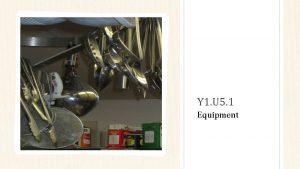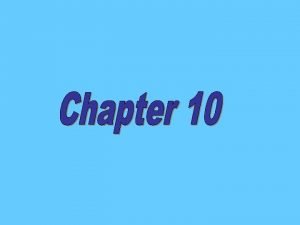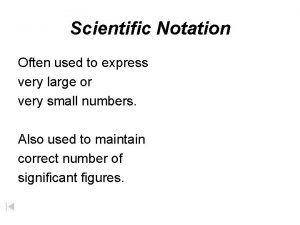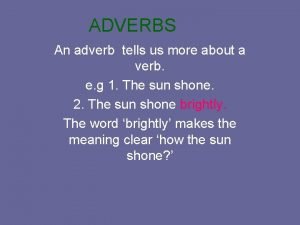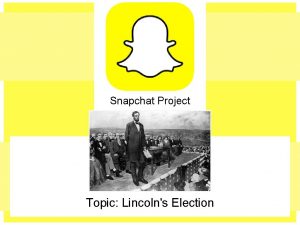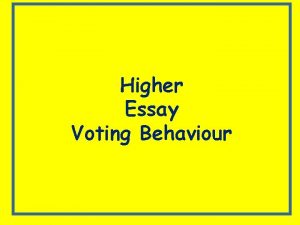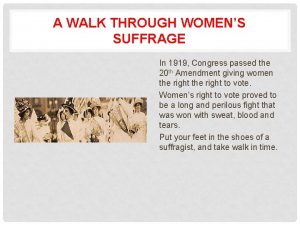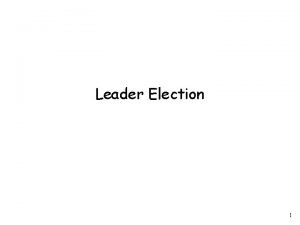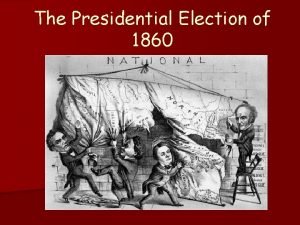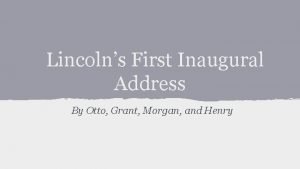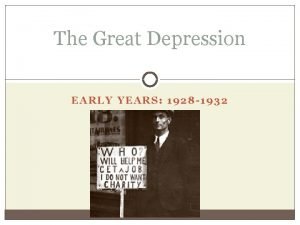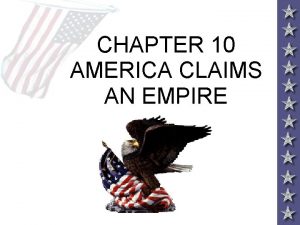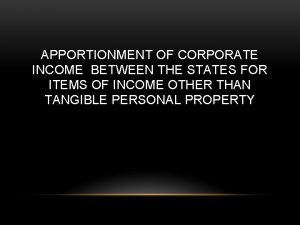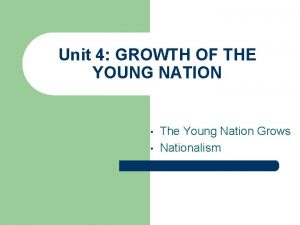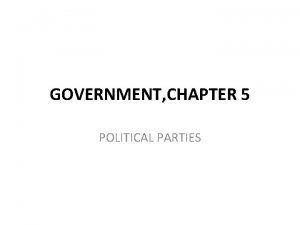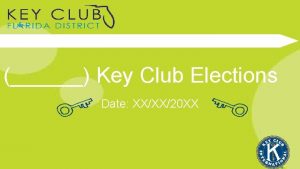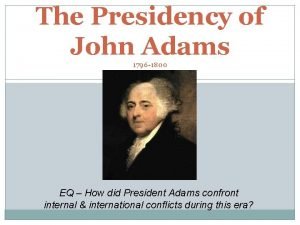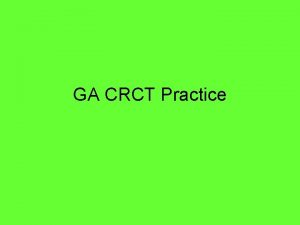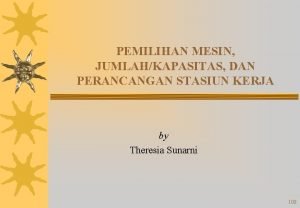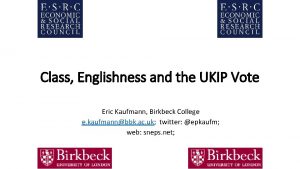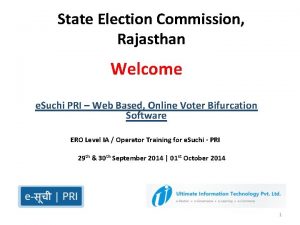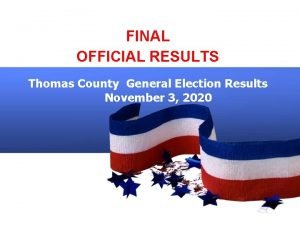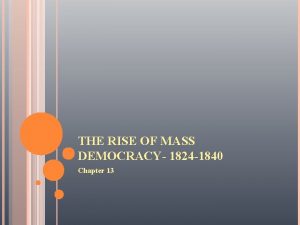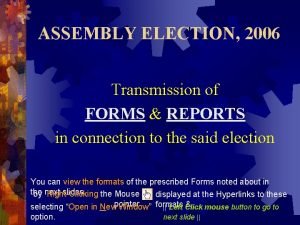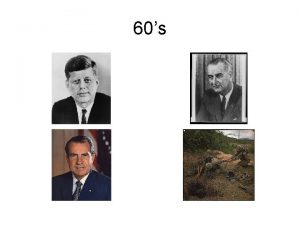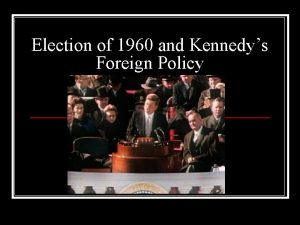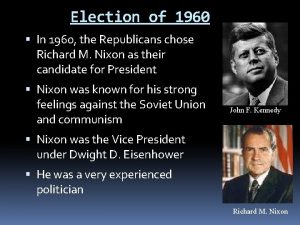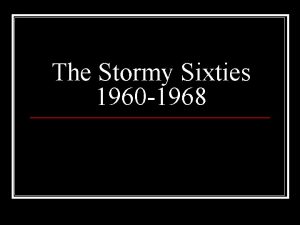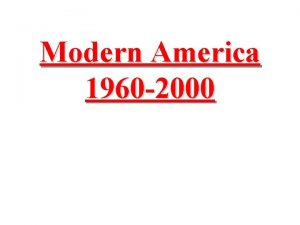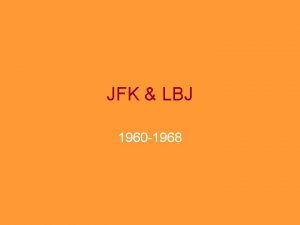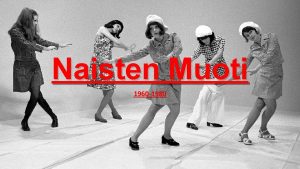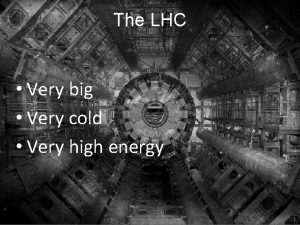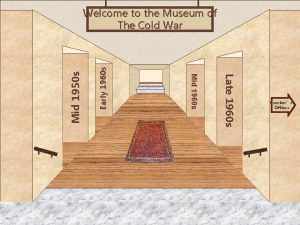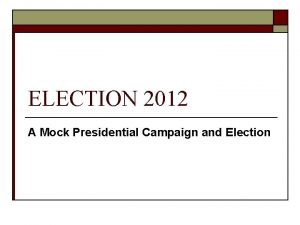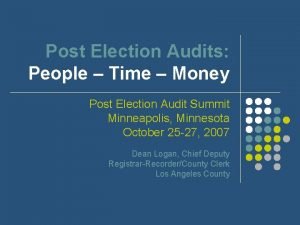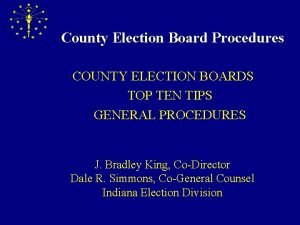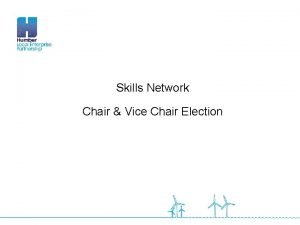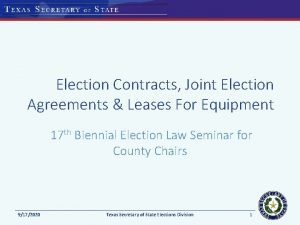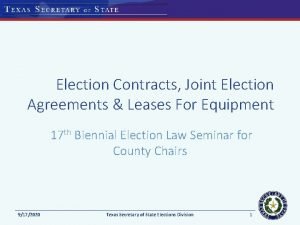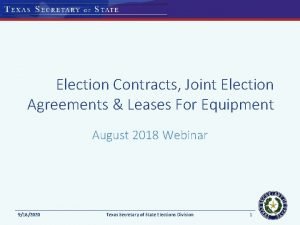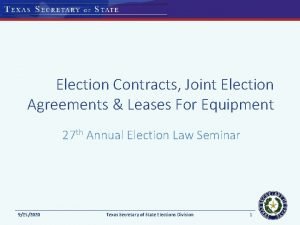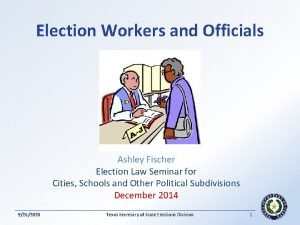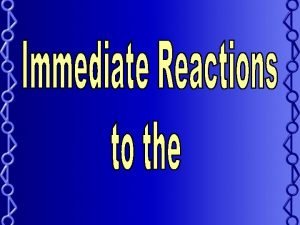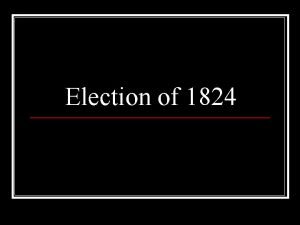The Early 1960 s Election of 1960 Very


































- Slides: 34

The Early 1960 s

Election of 1960 • Very tight race between Rep. nominee VP Richard M. Nixon and Dem. Nominee Sen. John F. Kennedy. • JFK accuses Republicans of falling behind in Cold War. • The debates—Kennedy wins on TV but Nixon on radio. • Kennedy wins tight election by 9, 000 votes in IL and 40, 000 in TX. Some believe there was fraud. • Kennedy is youngest elected president at 43 and first Catholic president.

JFK’s Inauguration We dare not forget today that we are the heirs of that first revolution. Let the word go forth from this time and place, to friend and foe alike, that the torch has been passed to a new generation of Americans--born in this century, tempered by war, disciplined by a hard and bitter peace, proud of our ancient heritage--and unwilling to witness or permit the slow undoing of those human rights to which this nation has always been committed, and to which we are committed today at home and around the world. Let every nation know, whether it wishes us well or ill, that we shall pay any price, bear any burden, meet any hardship, support any friend, oppose any foe to assure the survival and the success of liberty. This much we pledge--and more…. All this will not be finished in the first one hundred days. Nor will it be finished in the first one thousand days, nor in the life of this Administration, nor even perhaps in our lifetime on this planet. But let us begin. In your hands, my fellow citizens, more than mine, will rest the final success or failure of our course. Since this country was founded, each generation of Americans has been summoned to give testimony to its national loyalty. The graves of young Americans who answered the call to service surround the globe. Now the trumpet summons us again--not as a call to bear arms, though arms we need--not as a call to battle, though embattled we are-- but a call to bear the burden of a long twilight struggle, year in and year out, "rejoicing in hope, patient in tribulation"--a struggle against the common enemies of man: tyranny, poverty, disease and war itself. Can we forge against these enemies a grand global alliance, North and South, East and West, that can assure a more fruitful life for all mankind? Will you join in that historic effort? In the long history of the world, only a few generations have been granted the role of defending freedom in its hour of maximum danger. I do not shrink from this responsibility--I welcome it. I do not believe that any of us would exchange places with any other people or any other generation. The energy, the faith, the devotion which we bring to this endeavor will light our country and all who serve it--and the glow from that fire can truly light the world. And so, my fellow Americans: ask not what your country can do for you--ask what you can do for your country. My fellow citizens of the world: ask not what America will do for you, but what together we can do for the freedom of man.

Cuba • In the 1950 s, the US supported dictator Fulgencio Batista. He was seen as corrupt and cruel. • Fidel Castro led a Marxist revolutionary movement against Batista. • In 1959, Castro’s army wins control of the nation. • The US recognized Castro’s government at first, but Castro nationalized many American businesses like United Fruit.

Cuba • When the US begins to show signs of alienation he allies himself with the Soviet Union. • The USSR loves Castro because it would love to have an ally only 90 miles off the coast of the US. • Communism is now in the Americas. • Many non-communist Cubans flee to Florida. • US embargos Cuban goods.

Bay of Pigs • A failed CIA attempt to kick out Castro. • The CIA trained an army Cuban refugees to retake control of Cuba and make it noncommunist in 1961. • Plan was formulated under Eisenhower, but JFK inherited and approved the plan. • The attempt fails and it humiliates the US in the eyes of the world. • It also draws Cuba closer to the USSR.

Berlin Wall • Khrushchev tried to get East Germany to close access to West Berlin. • First constructed in 1961, it became a symbol of the Cold War. • Between 1949 -1962, 2. 5 million people fled East Berlin to go to freedom in West Berlin. • Initially, a barbed wire fence was laid down followed by construction of one wall 12 ft. high with a second one paralleling it with a no-man’s land in between. • Only 5, 000 people made it across between 1962 -1989 when the wall fell. • Around 200 people were killed in making the attempt. • The wall separated East and West Berlin and was a symbol of the tensions between East and West.

Cuban Missile Crisis • From October 16, to 28, 1962, the world came close to WWIII. • U-2 spy planes found ICBM missiles, capable of holding nuclear warheads, being constructed in Cuba. • These missiles could strike anywhere in the US in a matter of minutes.

Cuban Missile Crisis • President John F. Kennedy ordered Khrushchev to remove the missiles or face war. • He also placed a “quarantine” around Cuba. • Khrushchev backed down (which would lead to his fall), but only after JFK agreed to remove missiles from Turkey.

Effects of Cuban Missile Crisis • No ICBMs in Cuba or in Turkey. • Set up the “hotline” which could help the US and USSR heads talk to each directly to other instead of going through ambassadors and dealing with the time zone issues. • Limited Test Ban Treaty signed in 1963 which bans testing of nuclear bombs in the atmosphere. • Khrushchev will end up being replaced as head of USSR with Leonid Brezhnev.

Question Time • 1. We still do not trade or associate with Cuba today. Some say we should begin to trade and that capitalism will take over there. Others think we should wait until Castro dies. What do you think? • 2. If you were president, how would you have handled the Cuban Missile Crisis? • 3. How has tv changed politics?

The Space Race Heats Up • May 5, 1961—Alan Shepard becomes first American into space. • February 20, 1962—John Glenn becomes first American to orbit Earth. • Mercury Project put men into space. • Gemini Project allowed men to do experiments for future launches. • On May 25, 1961 JFK announces his plans for the Apollo Project to go to the moon.

The Kennedy Mystique • Called “Camelot” because his term was said to have potential and promise for the future, and the period was symbolic of hope for many in the world, who were inspired by Kennedy's speeches, vision and political policies. • JFK spoke on TV a lot because his charm appealed to people. • First Lady Jacqueline Kennedy took people on a TV tour of the White House after redecorating it.

The New Frontier • Kennedy’s plan to reshape America. • Wanted to aid education, give better medical aid to the elderly, and rebuild urban centers. • Lacked the mandate to get full congressional support. • Increased government spending and lowered taxes to help companies and people get money to spend it. • Increased defense spending by 20%. • Raised minimum wage to $1. 25/hr.

The Peace Corps • Created by JFK in 1961 to promote world peace and friendship. • Helps people in poor countries in Asia, Africa, and Latin America to build schools, help in times of crisis, help irrigate farm lands, deal with diseases, train people on new technologies, and foster goodwill amongst nations. • Since 1960, more than 187, 000 people have served as Peace Corps volunteers in 139 countries.

Alliance for Progress • Aimed to establish economic cooperation between North and South America by JFK. • The aid was intended to counter the perceived emerging communist threat from Cuba to U. S. interests and dominance in the region. • Between 1962 and 1967 the US supplied $1. 4 billion per year to Latin America to build schools, houses, better sanitation, hospitals, and encourage economic development. • Program ended when Nixon became president.

Domestic Issues • Blacks began to push for civil rights legislation (Civil Rights movement had started in mid 1950 s). • Millions of people living in poverty…including 4, 200 living on less than $1, 000 per year. • Attorney General Robert F. Kennedy targeted the mafia and people who helped keep segregation the law of the land.

EEOC • The Equal Employment Opportunity Commission, or EEOC, is a federal agency tasked with ending employment discrimination. • Created by JFK in 1961. • Prevents discrimination based on race, sex, age, disability, etc.

Assassination • On November 22, 1963, JFK was in Dallas, TX to give a speech to help the Democratic Party raise funds for the upcoming election year. • He was expecting a cool reception in Dallas, a fairly conservative and Southern city. • At 12: 30 pm….

Assassination • JFK was shot twice, once in the neck from behind and once in the head from the front. • He was pronounced dead at 1: 33 pm. CST • Texas gov. John Connally was also wounded.

Assassination • Lee Harvey Oswald is arrested in a local theater and charged with the assassination and the murder of a Dallas police officer. • Had connections to the KGB. • On Nov. 24, he was being moved to Dallas County jail from the police station and he was murdered by nightclub owner Jack Ruby on live TV.

Assassination • Lyndon Baines Johnson becomes the president after the assassination. • Warren Commission looks into the assassination…comes up with “single bullet theory” and “Oswald acted alone”. • Loss of innocence for Americans. • Some still feel there is a larger conspiracy.

Election of 1964 • LBJ runs on a platform of continuing JFK’s legacy. • Republicans nominated conservative Barry Goldwater to run. • Goldwater was portrayed, easily, as a right-wing nut who is racist and wants to use nuclear weapons. • LBJ easily wins reelection.

Question Time • 4. How did tv make JFK so popular? • 5. What did Kennedy try to accomplish as president? • 6. Why is JFK’s assassination seem so much more tragic than the others?

War on Poverty • LBJ’s biggest goal was to eliminate poverty in America. • In August 1964, Johnson passes the Economic Opportunity Act. It approved $1 billion in youth programs, small business loans, job training, and antipoverty measures. • The act created the Job Corps (to train youth), VISTA, Head Start, and Community Action Program.

The Great Society • LBJ’s plan to help end racism and poverty conditions in America. • Many programs still in effect today. • Passed 206 laws from 1965 -1966. • Passes Civil Rights law of 1964 • Installs the food stamp program. • National Teachers Corp. gives money to rural and impoverished schools to hire teachers. • Bilingual Education Act of 1968 gives money to help students who don’t speak English.

The Great Society • In 1965, he signs the Medicare Act which gives low cost medical insurance to elderly people. • The following year, Medicaid gives similar benefits to welfare recipients. • Gave welfare to poor people. • Appalachian Regional Development Act of 1965 gives money for highways, schools, hospitals, and electricity for rural Appalachia. • Fair Housing Act of 1968 forbids people from being denied housing for anything other than financial reasons.

The Great Society • Establishes NPR and PBS. • Gives money for schools for textbooks and special education programs. Head Start • Creates National Foundation for the Arts and Humanities. • Passes Clear Air and Clear Water Acts. • 1966 Highway Safety Act. • Poverty rates fall from 22. 2% in 1963 to 12. 6% in 1970 and for Black families from 55% in 1960 to 27% in 1970.

Miranda Rights • Miranda v. Arizona was a landmark 5 -4 decision of the Supreme Court. • The Court held that criminal suspects must be informed of their right to consult with an attorney and of their right against self-incrimination prior to questioning by police. • Ernesto Arturo Miranda was arrested for rape. He later confessed to robbery and attempted rape under interrogation by police. • At trial, prosecutors offered only his confession as evidence. Miranda was convicted of rape and kidnapping and sentenced to 20 to 30 years imprisonment on each charge, with sentences to run concurrently. • Miranda's court-appointed lawyer, Alvin Moore, appealed to the Arizona Supreme Court which affirmed the trial court's decision. In affirming, the Arizona Supreme Court emphasized heavily the fact that Miranda did not specifically request counsel.

Miranda Rights • The person in custody must, prior to interrogation, be clearly informed that he has the right to remain silent, and that anything he says will be used against him in court; he must be clearly informed that he has the right to consult with a lawyer and to have the lawyer with him during interrogation, and that, if he is indigent, a lawyer will be appointed to represent him. –Chief Justice Earl Warren

Impact of Great Society • Increase in governmental spending on social programs. • More government power than ever before. • Civil Rights Act of 1964 will extend and protect rights of Blacks and help to end segregation. • War on Poverty helps minorities escape poverty cycle. • Social programs are often cut today to save money and become campaign issues. • LBJ’s presidency is seen as both great and controversial.

Impact of Great Society • Tax cut pushed by LBJ to jumpstart the economy will create a huge deficit the government cannot get out of. • Conservative backlash against social programs helps brings many national Republicans to prominence—Ronald Reagan. • Vietnam War will draw a lot of money away from social programs. • LBJ’s support of Vietnam War will cause backlash against his programs.

Trouble Looms…… • LBJ could not live in JFK’s shadow for long. As the 1960 s roll on, the war in Vietnam begins to overshadow his domestic reforms. The year 1968 is a year of hardship, tragedy, and struggles and will change the nation forever…

Question Time • 7. What was LBJ’s plan to end poverty? • 8. Name some programs started by LBJ that we have today?
 1960 election
1960 election Is a very shallow skillet with very short sloping sides
Is a very shallow skillet with very short sloping sides Very bad to very good scale
Very bad to very good scale Few food or little food
Few food or little food Multiplication of scientific notation
Multiplication of scientific notation Fewfewfewf
Fewfewfewf Adverb tells when
Adverb tells when If susan had taken the map she not get lost
If susan had taken the map she not get lost Early cpr and early defibrillation can: *
Early cpr and early defibrillation can: * Lincolns election date
Lincolns election date Clarity election night reporting
Clarity election night reporting Importance of election essay
Importance of election essay Election day political cartoon
Election day political cartoon Leader election problem
Leader election problem Definition
Definition Election of 1860 pie chart
Election of 1860 pie chart 1932 presidential election
1932 presidential election Lincolns election
Lincolns election Election of 1896
Election of 1896 Arizona multistate service provider election
Arizona multistate service provider election Main idea
Main idea Economic protest parties definition
Economic protest parties definition Duties of polling officer in election 2014
Duties of polling officer in election 2014 1796 election
1796 election Key club caucus questions
Key club caucus questions What measures were contained in the alien and sedition acts
What measures were contained in the alien and sedition acts Which statement best describes modern north korea?
Which statement best describes modern north korea? Election machine
Election machine British election study
British election study E-suchi
E-suchi Cobra election form sample
Cobra election form sample George caleb bingham the county election
George caleb bingham the county election Thomas county election results
Thomas county election results Maysville veto
Maysville veto Dcrc full form in election
Dcrc full form in election

